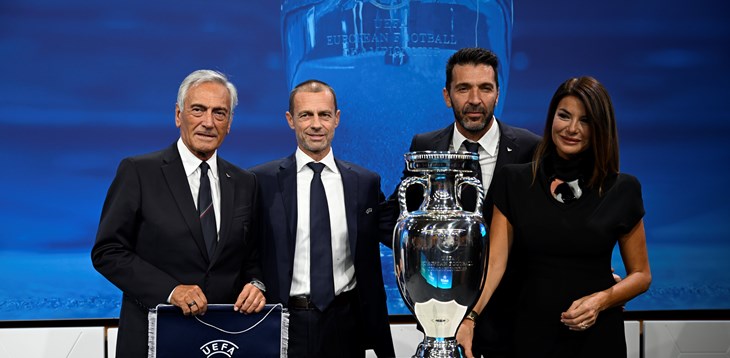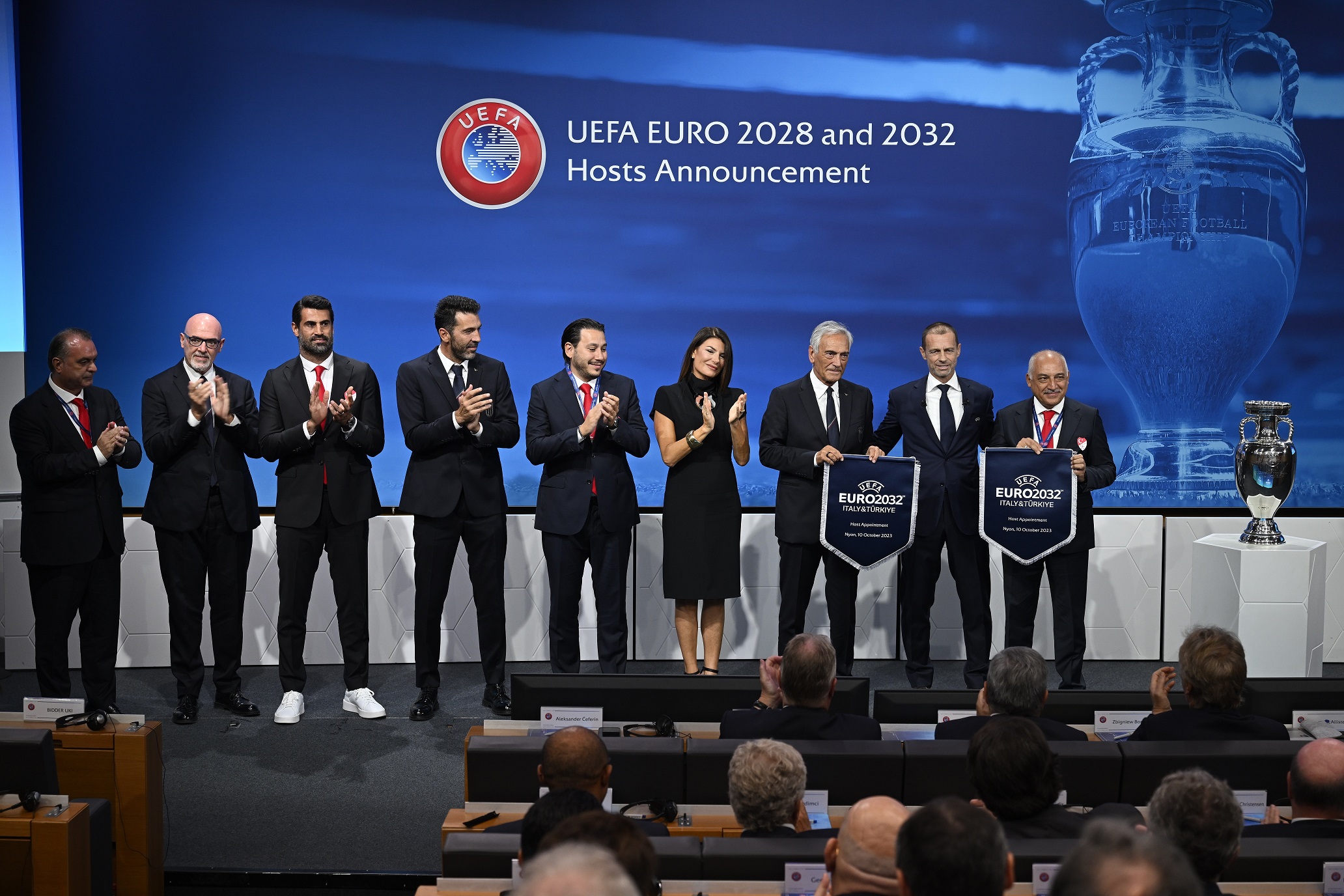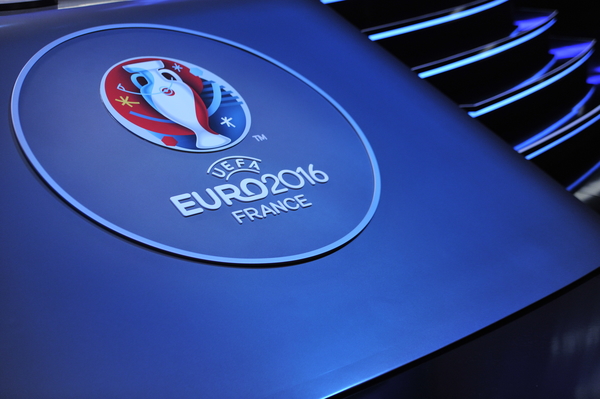
FIGC promoting UEFA's heart resuscitation campaign
29 February 2024
Tuesday, October 10, 2023

Italy will host the 2031 edition of the Euros alongside Turkey. During today’s ceremony at the Football Confederation headquarters in Nyon, the UEFA Executive Committee accepted the FIGC and the TFF’s joint application to host the competition just under 9 years away, after they decided to join forces last July.
“We would like to express our gratitude to UEFA”, commented the presidents of the FIGC, Gabriele Gravina, and of the TFF, Mehmet Büyükekşi, “for honouring us with the role of hosting EURO 2032 as two countries that share in Mediterranean culture. The Italian and Turkish Federations have joined forces intending to host the best Euros ever organised, forming new friendships and leaving a lasting mark on the history of football. In the coming years, Italy and Turkey will work together closely, with the great passion and awareness necessary to offer the best experience of the Euros to our fans, as we underline with the motto ‘Play as One’”.

Thus, over the next 9 years, the Euros will traverse Europe from North to South, starting from the middle of the continent. After the 17th edition of the tournament to be held in Germany in 8 months, it will cross the North Sea and find itself in the United Kingdom and Ireland which will host the 2028 competition. Then it will do a U-turn toward the South, the Meditteranean, where Italy and Turkey will host EURO 2032 with 5 different cities in each country set to host the games.
UEFA’s decision thus closes the selection process that began on 17 December 2021. The were 4 initial candidates to host: Russia, the United Kingdom and Ireland, Italy, and Turkey. This number was cut down to 3 by the Executive’s decision to declare the dossier from the Russian Football Federation (RFU) as unsuitable on 2 May 2023, in line with article 16.02 of the Candidacy Rules. And then there were two, until the Italian and Turkish Football Federations decided to join forces and submit a dossier together.
EURO 2028 will be hosted by the United Kingdom and Ireland, with five football federations between them: England, Scotland, Wales, Northern Ireland and Ireland will host the sport that they invented almost 150 years ago, between 1863 and 1881 (the period when the respective football federations were founded). England has already hosted the competition in 1996 which was won by Germany, whilst the latest edition in 2020, played in 2021, also saw some games played in London and Glasgow, including the finals won by Italy.
In 2032, the final round of the tournament will be played in Italy for the third time in history, after 1980, and 1968, both a much smaller competition compared to what we see nowadays with 24 countries participating. In the 2020 edition, played in 2021, games were also played in Rome (some of the group stage and the quarter-final). Turkey has hosted two Champions League finals in recent years (2003 and 2023), it will be their first time hosting the Euros: they submitted a bid to host with Greece in 2008 but were rejected in favour of Austria and Switzerland, in 2012 they tried again but Poland and Ukraine were chosen, and in 2016 when France hosted. Italy were also unsuccessful in the 2012 and 2016 bids to host.
THE ITALIAN DOSSIER. Ten cities have been included in the Italian dossier, which represents the country’s cultural and artistic heritage and at the same time Italy’s footballing history, tradition and passion which will guarantee an exciting fan experience. In support of a major event such as the European Championship, the considerable experience of the Italian footballing system in the organisation of major events was highlighted (in recent years: EURO 2020, Nations League Finals 2021, Euro Under 21 2019, 2009 and 2016 Champions League Finals, 2014 Europa League Final and the 2016 and 2022 Women’s Champions League Finals), In this sense, the approach envisaged in the application also included a scrupulous degree of attention to the sustainability of sporting events: from the inclusion to respect of human rights to the attention to climate change and opportunities and opportunities for people with disabilities.
The FIGC envisages that EURO 2032 will also be an opportunity to develop and modernise sporting infrastructure in the country, an event that will be able to contribute to the acceleration of processes already underway in different cities. From a sporting point of view, such an event will further broaden the base of the football movement through specific projects that bring girls and boys closer to football.
THE CEREMONY. In Nyon, the Italian delegation was headed up by FIGC president and vice president of UEFA, Gabriele Gravina, along with the General Secretary, Marco Brunelli, the Project Manager Euro 2032, Antonio Talarico, and the entire team who worked on the proposal. For Turkey, the president of the Turkish Football Federation (TFF), Mehmet Büyükekşi, was present alongside the General Secretary, Kadir Kardaş, and the vice president, Mustafa Eröğüt.
Two ambassadors were chosen by the FIGC to present that dossier to the Executives: Head of the Delegation, Gianluigi Buffon, and the journalist and TV presenter, Ilaria D’Amico. The Turkish ambassador was Volkan Demirel, the ex-goalkeeper of the Turkish National team (66 appearances between 2004 and 2014).
In the 11 minutes available to the Ambassadors, they talked about the respective qualities that the two countries bring to the field: for Italy, it was based on the tradition of hospitality and welcoming, on the extraordinary cultural, artistic and natural riches, on its multicultural roots and its true passion for football. And again the aspiration of a tournament that wants to help unite people and cultures, through that unique enthusiasm that football is able to create; an aspiration also summarised in the claim 'We play as one', which symbolises the unity of intent between the Federations of Italy and Turkey, who have chosen to take on the Euro 2032 together, putting their strengths at the disposal of European football. For the presentation, the FIGC was supported by Independent Ideas, the creative agency of Publicis Groupe.

 The last round of the European Championships was played in Italy for the first time: the hosts were chosen from the 4 countries in the finals. As well as Italy, there was the Soviet Union, England, and Yugoslavia. Games were played in Rome at the Stadio Olimpico, Naples at San Paolo, and Florence at Comunale, known as the Artemio Franchi stadium since 1991. Italy beat the USSR in Napoli on June 5 thanks to Giacinto Facchetti’s stroke of luck: after the 0-0 result, a coin was tossed to decide the winner since penalties were not yet used. Yugoslavia got the better of England the same evening in Florence. On 8 June the final was played in Rome: Dzajic and Domenghini scored the 1-1 draw which meant the game was replayed two days later. Then, Anastasi and Riva got two goals to beat Yugoslavia 2-0, bringing home Italy’s first European title.
The last round of the European Championships was played in Italy for the first time: the hosts were chosen from the 4 countries in the finals. As well as Italy, there was the Soviet Union, England, and Yugoslavia. Games were played in Rome at the Stadio Olimpico, Naples at San Paolo, and Florence at Comunale, known as the Artemio Franchi stadium since 1991. Italy beat the USSR in Napoli on June 5 thanks to Giacinto Facchetti’s stroke of luck: after the 0-0 result, a coin was tossed to decide the winner since penalties were not yet used. Yugoslavia got the better of England the same evening in Florence. On 8 June the final was played in Rome: Dzajic and Domenghini scored the 1-1 draw which meant the game was replayed two days later. Then, Anastasi and Riva got two goals to beat Yugoslavia 2-0, bringing home Italy’s first European title.

 In the latest Euros, played between June and July 2021 after being postponed due to the pandemic, Italy was one of 12 countries to play host to the tournament. Three group-stage knockout games and one of the quarter-finals was played in Italy in accordance with the government's regulations for stopping the spread of Covid-19.
In the latest Euros, played between June and July 2021 after being postponed due to the pandemic, Italy was one of 12 countries to play host to the tournament. Three group-stage knockout games and one of the quarter-finals was played in Italy in accordance with the government's regulations for stopping the spread of Covid-19.
The European Championships is the third biggest sporting event in terms of economic impact, promotional capacity and tourist appeal, after the FIFA World Cup and the Olympic Games. Like the other two global sporting events, the countries that host the tournaments have the chance to invest in permanent assets, both in renewing sporting facilities as well as modernising the country’s infrastructure. In the last Euros, also those organised by two countries, like Austria-Switzerland 2008 and Poland-Ukraine 2012, the economic impact of the Euros contributed to the improvement of the national GDP, the creation of new jobs and an improvement in the transport networks (new metro lines, upgrading the road and rail network), as well as an increase in foreign visitors who, with their spending capacity, generate mid-to-long term value for the host countries.

The last European Championship to be held in one country, EURO 2016 in France, which achieved a turnover of EUR 1.9 billion (according to the UEFA figures). EURO 2020, playing 2021 with a touring format in 12 European cities and with stadiums at a reduced capacity due to pandemic regulations, ended with revenues of over EUR 1.8 billion. Regarding the economic impact of the 4 matches played in Rome in June, it was estimated that an increase of approximately 40,000 tourists (+28.81%) compared to the previous month (59.2% of tickets were sold abroad), who had an important impact on consumption in the city. An estimated 25.8 million was spent on hotels, restaurants, shopping and public and private transport, sparking a 0.08% increase in the regional GDP, including the growth of regional exports worth approximately 5 million. In terms of employment, it is estimated that the event generated a net additional volume of 117,150 man-months of work, the equivalent of 9,762 annual full-time positions.
Among other things, the 2020 European Championship, even though it involved only one Italian city and for only four matches, accelerated the approval of a number of regulations for major sporting events in our country, such as the new regulation of the ban on parasitic advertising (Ambush Marketing), in compliance with one of the requirements for organising the competition.